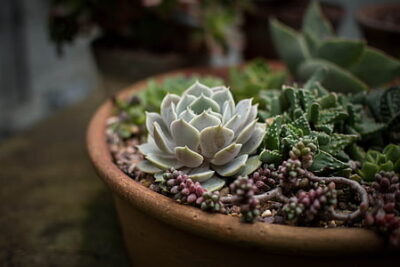
Can Bearded Dragons Safely Include Succulents in Their Diet?
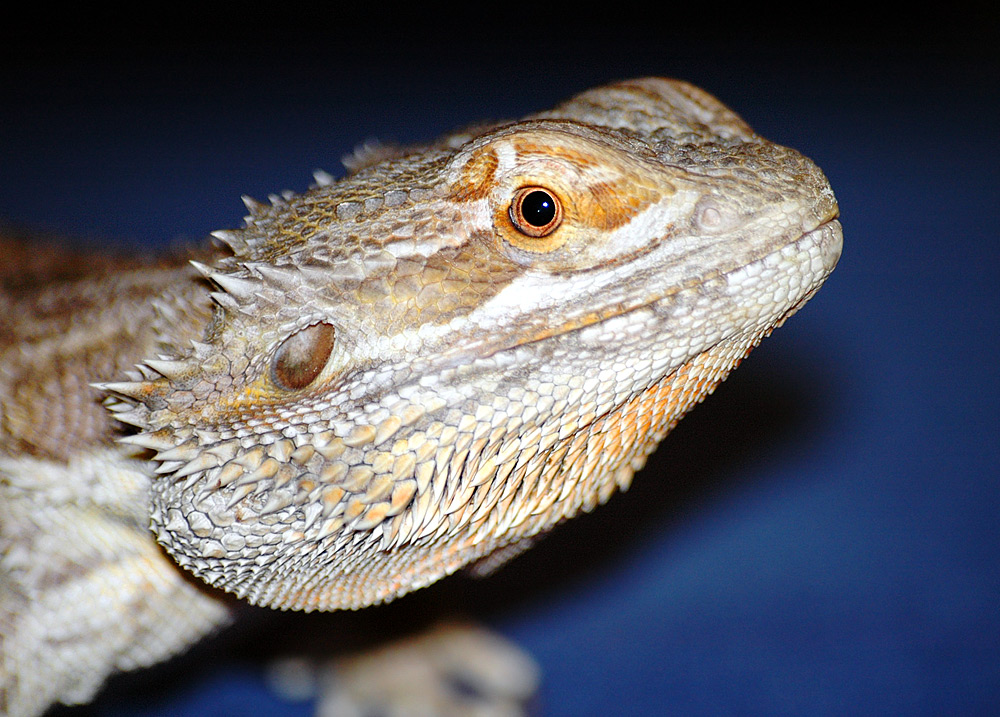
Bearded dragons are popular reptile pets known for their unique appearance and docile nature. As omnivores, they require a balanced diet consisting of both animal protein and plant matter to thrive. While leafy greens and vegetables are commonly included in their diet, some bearded dragon owners have wondered whether succulents, with their thick and fleshy leaves, can be safely incorporated into their pets' meals.
We will explore the suitability of succulents as a food source for bearded dragons. We will discuss the nutritional needs of these reptiles and examine the potential benefits and risks of including succulents in their diet. Additionally, we will provide guidance on which types of succulents are safe for consumption and how to properly prepare and serve them to ensure the health and well-being of your bearded dragon.
- Yes, bearded dragons can safely include succulents in their diet
- Succulents can provide a variety of nutrients for bearded dragons
- However, it is important to choose the right types of succulents for their diet
- Bearded dragons should only eat non-toxic succulents
- Some safe succulents for bearded dragons include hens and chicks, sedum, and aloe vera
- It is important to wash the succulents thoroughly before feeding them to the bearded dragon
- Bearded dragons should only eat succulents as a treat and not as a staple food
- Moderation is key when including succulents in a bearded dragon's diet
- Always consult with a veterinarian or reptile expert for specific dietary recommendations for your bearded dragon
- Frequently Asked Questions
Yes, bearded dragons can safely include succulents in their diet
Bearded dragons are known for their diverse diet, which consists mainly of insects, vegetables, and fruits. However, many owners wonder if succulents, with their unique appearance and water-storing capabilities, can be a safe addition to their bearded dragon's diet. The answer is yes, bearded dragons can safely include succulents in their diet, but with some considerations.
Choosing the Right Succulents
Before introducing succulents to your bearded dragon's diet, it's crucial to ensure that they are safe and non-toxic for reptiles. Some common succulents that are safe to feed to bearded dragons include:
- Hens and Chicks (Sempervivum): These succulents have thick, fleshy leaves that are safe for bearded dragons to consume.
- Prickly Pear (Opuntia): Bearded dragons can enjoy the pads and fruits of this succulent, but be cautious of the spines and remove them before feeding.
- Aloe Vera: This succulent has numerous health benefits for bearded dragons and can be added to their diet in moderation.
It's important to research and confirm the safety of any succulent before feeding it to your bearded dragon. Avoid succulents that may contain toxic substances or have thorns or spines that can harm your pet.
Preparing Succulents for Feeding
Properly preparing succulents for your bearded dragon is essential to ensure their safety and digestibility. Follow these steps:
 Explore Hello Succulent Studio's Latest Discounts and Promotions!
Explore Hello Succulent Studio's Latest Discounts and Promotions!- Wash the Succulent: Thoroughly rinse the succulent leaves to remove any potential pesticides or dirt.
- Remove Thorns or Spines: If the succulent has thorns or spines, carefully remove them to prevent any harm to your bearded dragon.
- Cut into Bite-sized Pieces: Cut the succulent into small, manageable pieces that are easy for your bearded dragon to eat and digest.
By taking these precautions, you can ensure that the succulents are safe for your bearded dragon to consume and minimize any potential risks.
Feeding Succulents in Moderation
Succulents should be fed to your bearded dragon in moderation and as part of a balanced diet. While they contain beneficial nutrients and can provide hydration, they should not replace the staple foods in your pet's diet, such as insects and leafy greens.
It's recommended to offer succulents as occasional treats or supplements to diversify your bearded dragon's diet. Monitor your pet's response to the succulents and adjust the quantity accordingly to avoid any digestive issues.
Bearded dragons can safely include succulents in their diet, but it's essential to choose the right succulents, prepare them correctly, and feed them in moderation. Always prioritize the overall health and well-being of your bearded dragon by providing a balanced and varied diet.
Succulents can provide a variety of nutrients for bearded dragons
Bearded dragons, known for their omnivorous diet, can benefit from the inclusion of succulents in their meals. These plants, which are known for their thick and fleshy leaves, provide a variety of nutrients that can contribute to the overall health of your bearded dragon.
The nutritional benefits of succulents for bearded dragons
Succulents are packed with essential vitamins and minerals that are crucial for the well-being of your bearded dragon. They are a great source of fiber, which aids in digestion and prevents constipation. Additionally, succulents are rich in vitamins A and C, both of which are important for maintaining a healthy immune system and promoting optimal growth.
 Harmony: Cats and Succulents Coexisting Peacefully
Harmony: Cats and Succulents Coexisting PeacefullySucculents also provide calcium, an essential mineral that is vital for the development and maintenance of strong bones and teeth in bearded dragons. The high calcium content in succulents can help prevent metabolic bone disease, a common health issue in reptiles.
Furthermore, succulents offer hydration to bearded dragons due to their high water content. This can be especially beneficial during hot weather or when your bearded dragon is experiencing dehydration.
Choosing the right succulents for your bearded dragon
When selecting succulents for your bearded dragon, it's important to choose varieties that are safe and non-toxic. Avoid succulents that are known to be toxic to reptiles, such as aloe vera, certain types of jade plants, and some species of Echeveria.
Opt for succulents that are safe for consumption, such as hens and chicks (Sempervivum), prickly pear cactus (Opuntia), and sedum varieties. These succulents are not only safe for bearded dragons but also offer a good balance of nutrients.
Preparing succulents for your bearded dragon
Before feeding succulents to your bearded dragon, it's crucial to properly prepare them. Wash the leaves thoroughly to remove any dirt or potential pesticides. Trim the succulent leaves into bite-sized pieces, making it easier for your bearded dragon to consume.
It's important to note that succulents should be offered to bearded dragons as part of a well-balanced diet. They should not be the sole source of nutrition. Consult with a reptile veterinarian or a herpetologist to ensure you are providing a varied and appropriate diet for your bearded dragon.
Including succulents in a bearded dragon's diet can provide a range of nutritional benefits. However, it's essential to choose safe varieties, prepare them properly, and offer them as part of a balanced diet. Always prioritize the overall health and well-being of your bearded dragon by consulting with experts and providing a diverse range of nutritious foods.
 Where to Find the Best Succulents in San Diego: Your Ultimate Guide
Where to Find the Best Succulents in San Diego: Your Ultimate GuideHowever, it is important to choose the right types of succulents for their diet
When it comes to the diet of bearded dragons, it's crucial to ensure that they are provided with a well-balanced and nutritious variety of food. While bearded dragons are primarily insectivores, they can also benefit from the inclusion of certain plant-based foods in their diet. Succulents, with their fleshy leaves and water-retaining properties, may seem like a suitable option for bearded dragons. However, it is important to choose the right types of succulents for their diet.
1. Safe Succulents for Bearded Dragons
Not all succulents are safe for bearded dragons to consume. Some succulents may contain toxins or have properties that can be harmful to their health. It is crucial to select succulents that are safe and non-toxic for bearded dragons. Some safe succulents that can be included in their diet include:
- Aloe vera
- Hens and chicks (Sempervivum)
- Prickly pear cactus (Opuntia)
- Sedum varieties
2. Preparing Succulents for Bearded Dragons
Before offering succulents to your bearded dragon, it is important to properly prepare them. Ensure that the succulents are thoroughly washed to remove any dirt, pesticides, or other contaminants. Remove any sharp spines or thorns from cactus varieties to prevent injury to your pet. It is also recommended to chop or shred the succulents into small, manageable pieces for easier consumption.
3. Moderation is Key
 Fascinating Facts: Unveiling the Wonders of Succulents
Fascinating Facts: Unveiling the Wonders of SucculentsWhile succulents can be a healthy addition to a bearded dragon's diet, it is important to offer them in moderation. Succulents should not be the primary source of food for bearded dragons but rather a supplement to their insect-based diet. Aim to offer succulents as occasional treats or as part of a varied diet to ensure proper nutrition and prevent any potential digestive issues.
It is worth noting that every bearded dragon is unique, and their dietary needs may vary. Consult with a reptile veterinarian or an experienced reptile keeper for specific dietary recommendations for your bearded dragon.
By selecting safe succulents, preparing them properly, and offering them in moderation, bearded dragons can safely include succulents in their diet. However, always prioritize the overall nutritional needs of your bearded dragon and ensure a well-rounded and balanced diet for their optimal health and well-being.
Bearded dragons should only eat non-toxic succulents
When it comes to the diet of bearded dragons, it is crucial to provide them with a variety of safe and nutritious foods. While insects and vegetables make up the majority of their diet, many reptile owners wonder if succulents can be included as well.
Before introducing any new food into your bearded dragon's diet, it is important to ensure that it is safe for them to consume. Some succulents can be toxic to reptiles and should be avoided at all costs. However, there are a few non-toxic succulents that can be safely included in their diet.
Non-toxic succulents for bearded dragons:
- Hens and Chicks (Sempervivum): This succulent is safe for bearded dragons and can be offered as an occasional treat. It provides some hydration and a small amount of nutrients.
- Prickly Pear Cactus (Opuntia): The pads of this cactus can be fed to bearded dragons in moderation. They are low in oxalates and can provide some essential vitamins and minerals.
- Sedum: Certain varieties of Sedum, such as Sedum rubrotinctum (Jelly Bean Plant), are safe for bearded dragons. However, feeding them should be done sparingly as a treat rather than a staple food.
It is important to note that while these succulents are considered non-toxic, they should still be offered in moderation. Bearded dragons require a balanced diet that includes a variety of other foods to meet their nutritional needs. Succulents should never replace the main components of their diet, such as insects and leafy greens.
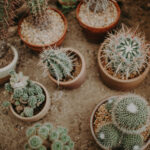 Find the Perfect Cactus and Succulent for Sale Nearby
Find the Perfect Cactus and Succulent for Sale NearbyWhen feeding succulents to your bearded dragon, it is essential to remove any thorns or prickles and wash the plant thoroughly to remove any potential pesticides or contaminants. Feeding them organic or homegrown succulents is always the safest option.
If you are unsure about the safety of a particular succulent, it is best to consult with a veterinarian who specializes in reptiles. They can provide you with the necessary guidance and ensure that your bearded dragon's diet remains healthy and balanced.
While some succulents can be included in a bearded dragon's diet, it is crucial to choose non-toxic varieties and offer them in moderation. Always prioritize a well-rounded diet that includes insects, leafy greens, and other essential foods to keep your bearded dragon healthy and thriving.
Some safe succulents for bearded dragons include hens and chicks, sedum, and aloe vera
Bearded dragons are fascinating reptiles that require a diverse diet to stay healthy. While their main diet consists of insects and leafy greens, it's not uncommon for bearded dragon owners to wonder if they can safely include succulents in their pet's diet.
The good news is that there are certain succulents that can be safely included in a bearded dragon's diet. These succulents are not only safe for your dragon to consume, but they can also provide some additional nutritional benefits.
Hens and Chicks (Sempervivum)
Hens and chicks, also known as Sempervivum, are a popular type of succulent that can be safely fed to bearded dragons. These plants are low in oxalates, which can be harmful to reptiles when consumed in large quantities. Hens and chicks are also rich in fiber, vitamins, and minerals, making them a nutritious addition to your dragon's diet.
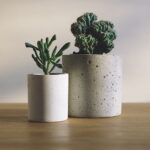 Is Succulent Studios Worth It? Read Reviews to Find Out!
Is Succulent Studios Worth It? Read Reviews to Find Out!Sedum
Sedum is another succulent that can be safely included in a bearded dragon's diet. This plant is high in calcium, which is essential for the development and maintenance of strong bones in reptiles. Additionally, sedum is low in oxalates and contains vitamins and minerals that can support your dragon's overall health.
Aloe Vera
Aloe vera is a well-known succulent with various health benefits for humans, but it can also be beneficial for bearded dragons. Aloe vera contains anti-inflammatory properties and can help soothe digestive issues in reptiles. However, it's important to note that only the inner gel of the aloe vera plant should be fed to your dragon. The outer skin and yellow sap can be toxic, so always make sure to remove them before feeding.
When introducing succulents into your bearded dragon's diet, it's crucial to do so in moderation and alongside a balanced diet. While these succulents can provide additional nutrients, they should not replace the main components of a bearded dragon's diet, such as insects and leafy greens.
Remember to always source succulents from reputable sources and avoid those treated with pesticides or fertilizers. Additionally, it's essential to observe your bearded dragon's behavior and health after introducing any new food item into their diet. If you notice any adverse reactions or changes in their appetite or digestion, consult a veterinarian for further guidance.
Certain succulents such as hens and chicks, sedum, and aloe vera can be safely included in a bearded dragon's diet. These succulents can provide additional nutrients and health benefits, but they should not replace the main components of a balanced diet. Always introduce new foods in moderation and monitor your dragon's health closely.
It is important to wash the succulents thoroughly before feeding them to the bearded dragon
When it comes to feeding your bearded dragon, it is essential to ensure that the food you provide is safe and suitable for their consumption. While bearded dragons are primarily omnivores and require a balanced diet of both plant matter and protein, you may be wondering if succulents can be included in their diet.
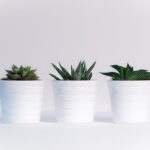 Get ready to crack up with these hilarious succulent quotes!
Get ready to crack up with these hilarious succulent quotes!While some succulents may be safe for bearded dragons to consume, it is crucial to take certain precautions before introducing them to your pet's diet. One essential step is to wash the succulents thoroughly to remove any potential pesticides or chemicals that may be present on the plant's surface.
Here are some key points to consider:
- Choose organic succulents or ensure they are pesticide-free.
- Thoroughly rinse the succulents under running water to remove any dirt, debris, or residue.
- Use a vegetable brush to gently scrub the leaves and stems, paying attention to any crevices or hard-to-reach areas.
- After washing, allow the succulents to air dry completely before feeding them to your bearded dragon.
Safe succulents for bearded dragons:
- Hens and Chicks (Sempervivum spp.)
- Aloe Vera (Aloe vera)
- Prickly Pear Cactus (Opuntia spp.)
- Sedum (Sedum spp.)
It is important to note that while these succulents are generally safe for bearded dragons, individual reptiles may have different sensitivities or allergies. Always monitor your bearded dragon closely after introducing any new food item to their diet and consult a veterinarian if you notice any adverse reactions.
Bearded dragons can include certain succulents in their diet, but precautions must be taken to ensure their safety. By washing the succulents thoroughly and choosing appropriate varieties, you can provide your bearded dragon with a diverse and nutritious diet.
Bearded dragons should only eat succulents as a treat and not as a staple food
While bearded dragons are known for their omnivorous diet, it is important to note that not all plants are suitable for their consumption. When it comes to succulents, it is generally safe for bearded dragons to include them in their diet, but only as an occasional treat and not as a staple food.
 Licensing Requirements for Selling Succulents: What You Need to Know
Licensing Requirements for Selling Succulents: What You Need to KnowWhy should succulents be given in moderation?
Succulents, such as cacti and aloe vera, can provide some nutritional benefits to bearded dragons. They are rich in fiber, vitamins, and minerals that can support their overall health. However, succulents are also high in water content and can be challenging for bearded dragons to digest in large quantities.
Feeding too many succulents to your bearded dragon can lead to digestive issues such as diarrhea or bloating. Additionally, some succulents may contain compounds that can be toxic to bearded dragons if consumed in excess. It is essential to ensure a balanced diet for your pet by offering a variety of other foods along with the occasional succulent treat.
How to safely include succulents in your bearded dragon's diet?
When offering succulents to your bearded dragon, it is crucial to follow these guidelines:
- Variety is key: Succulents should never be the sole source of food for your bearded dragon. They should be part of a varied and balanced diet that includes staple foods like leafy greens, vegetables, and protein sources.
- Choose safe succulents: Not all succulents are safe for bearded dragons. Avoid offering succulents that are known to be toxic to reptiles, such as certain types of cacti or plants treated with pesticides. Stick to commonly available and safe succulents like aloe vera.
- Offer in small portions: Limit the amount of succulents you offer to your bearded dragon. A small piece or a few leaves once or twice a week is sufficient. This way, you can provide the nutritional benefits without overwhelming their digestive system.
- Monitor their response: Pay attention to how your bearded dragon reacts to the succulents. If you notice any signs of digestive upset or discomfort, discontinue offering succulents and consult a veterinarian.
Remember, while succulents can be a tasty and nutritious treat for your bearded dragon, they should not replace the main components of their diet. Always prioritize a well-balanced and diverse diet to ensure your pet's optimal health and well-being.
Moderation is key when including succulents in a bearded dragon's diet
Bearded dragons are known for their diverse diet, consisting primarily of insects, vegetables, and fruits. However, some reptile owners wonder if it's safe to include succulents in their bearded dragon's diet. While succulents can offer some nutritional benefits, it's crucial to exercise moderation and consider a few factors before introducing them to your pet's menu.
The Nutritional Value of Succulents for Bearded Dragons
Succulents, such as aloe vera and prickly pear cactus, contain a variety of vitamins and minerals that can be beneficial for bearded dragons. These include vitamin C, vitamin E, potassium, calcium, and fiber. However, it's important to note that succulents should only be considered as occasional treats, rather than a staple food source.
 Exploring Trendy Succulent Slang on Urban Dictionary
Exploring Trendy Succulent Slang on Urban DictionaryPotential Risks and Considerations
While succulents can offer nutritional benefits, there are also potential risks to be aware of. Some succulents may have thorns or spines that can pose a choking hazard or cause injury to your bearded dragon's digestive system. It's essential to remove any thorns or spines and thoroughly wash the succulent before feeding it to your pet.
Additionally, not all succulents are safe for bearded dragons. Some may contain toxic compounds that can be harmful if ingested. Before introducing any new succulent to your bearded dragon's diet, it's crucial to research and ensure that it is safe for reptiles.
How to Safely Include Succulents in Your Bearded Dragon's Diet
If you decide to include succulents in your bearded dragon's diet, it's important to do so in moderation and follow these guidelines:
- Choose succulents that are known to be safe for bearded dragons, such as aloe vera and prickly pear cactus.
- Thoroughly wash the succulent and remove any thorns or spines before feeding it to your pet.
- Introduce succulents gradually and observe your bearded dragon's response. If any adverse reactions occur, discontinue feeding succulents immediately.
- Offer succulents as occasional treats, rather than a regular part of your bearded dragon's diet.
Note: Always consult with a reptile veterinarian before making any significant changes to your bearded dragon's diet or introducing new foods.
In conclusion
Succulents can be a nutritious addition to a bearded dragon's diet if offered in moderation and after ensuring their safety. However, it's crucial to consider potential risks, such as thorns or toxic compounds, and consult with a reptile veterinarian before making any dietary changes. By following these guidelines, you can safely include succulents as occasional treats for your beloved bearded dragon.
Always consult with a veterinarian or reptile expert for specific dietary recommendations for your bearded dragon
When it comes to caring for your bearded dragon, their diet plays a crucial role in their overall health and well-being. While bearded dragons are primarily insectivores, it is important to provide them with a balanced and varied diet that includes a mix of insects, vegetables, and greens.
One question that often arises is whether bearded dragons can safely include succulents in their diet. Succulents, known for their thick and fleshy leaves, are a popular choice for indoor gardening and landscaping due to their low maintenance and unique appearance. However, not all succulents are safe for your bearded dragon to consume.
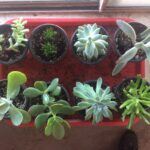 Join a Local Succulent Club and Connect with Fellow Plant Lovers
Join a Local Succulent Club and Connect with Fellow Plant LoversSafe Succulents for Bearded Dragons
Before introducing any new food into your bearded dragon's diet, it is important to ensure that it is safe and suitable for their consumption. Here are some succulents that are considered safe for bearded dragons:
- Aloe Vera: Aloe vera is a common succulent that has various health benefits for humans, and it can also be beneficial for bearded dragons. However, it should only be given in small amounts as an occasional treat due to its laxative properties.
- Hibiscus: Hibiscus plants are not only beautiful but also safe for bearded dragons. You can offer the flowers, leaves, and even the calyx (base of the flower) as a nutritious addition to their diet.
- Squash: While technically not a succulent, various types of squash, such as zucchini and butternut squash, can be included in your bearded dragon's diet. These vegetables are not only safe but also provide essential nutrients.
Remember, moderation is key when introducing new foods to your bearded dragon's diet. Always start with small amounts and observe how your dragon reacts to them. If there are any signs of digestive distress or abnormal behavior, it is best to discontinue the food and consult with a veterinarian.
Avoid These Succulents
While some succulents are safe for bearded dragons, there are others that should be strictly avoided. These succulents may contain toxic compounds that can be harmful or even fatal to your pet. Here are some succulents to steer clear of:
- Jade Plant: Also known as Crassula ovata, the jade plant is toxic to bearded dragons and should never be fed to them.
- Sago Palm: The sago palm (Cycas revoluta) is highly toxic to bearded dragons and should be kept far away from their reach.
- Agave: Although agave is commonly used to produce sweeteners and tequila, it is not safe for bearded dragons. The plant contains compounds that can be harmful to their health.
It is crucial to research and identify any succulent plants before adding them to your bearded dragon's enclosure. When in doubt, always err on the side of caution and avoid feeding your dragon any plants that you are unsure about.
Remember, every bearded dragon is unique, and their dietary needs may vary. It is always recommended to consult with a veterinarian or reptile expert for specific dietary recommendations tailored to your bearded dragon's age, size, and overall health.
Frequently Asked Questions
1. Can bearded dragons safely include succulents in their diet?
No, it is not recommended to feed succulents to bearded dragons as they can be toxic and cause digestive issues.
2. What should bearded dragons eat as part of their diet?
Bearded dragons should primarily eat a diet consisting of insects, such as crickets and mealworms, as well as leafy greens and vegetables.
3. Can bearded dragons eat fruits?
Yes, bearded dragons can eat fruits in moderation. However, fruits should not make up a large portion of their diet as they are high in sugar.
4. Can bearded dragons eat commercial reptile food pellets?
While commercial reptile food pellets can be used as a supplement, they should not be the sole source of nutrition for bearded dragons. Fresh foods should always be included in their diet.
If you want to read more articles similar to Can Bearded Dragons Safely Include Succulents in Their Diet?, you can visit the Miscellaneous category.


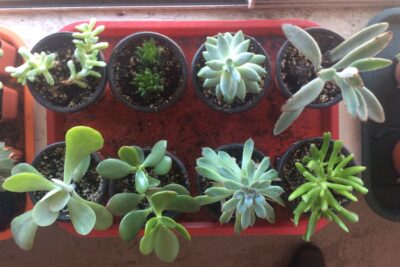



You Must Read